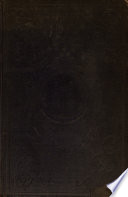 | John Milton - Authors, English - 1851 - 428 pages
...Primum ipni tibi. Milton with great depth of judgment observes, in his " Apology for Smeetymnuus," that, " he who would not be frustrate of his hope to write well in laudable things, ought himself to bo a true poem, that is, a eomposition of the best and honourablest... | |
 | John Milton - 1852 - 472 pages
...those to whom they devote their verse, displaying sublime and pure thoughts without transgression. And long it was not after, when I was confirmed in this opinion, that he who would not frustrate of his hope to write well hereafter, in things laudable, ought himself to be a true poem;... | |
 | 1852 - 634 pages
...lecturer, as sure as fate, a rebuke, though from young lips, that would have made his old face blush. " He who would not be frustrate of his hope to write well hereafter in landable things, ought himself to be a true poem :" — fancy that sentence — an early and often... | |
 | Samuel Taylor Coleridge - 1853 - 580 pages
...good man. Dedication to the Fox.* Ben Jonson has borrowed this just and noble sentiment from Strabo. * "He who would not be frustrate of his hope to write...that is a composition and pattern of the best and honourablest things — not presuming to sing high praises of heroic men or famous cities, unless he... | |
 | Samuel Taylor Coleridge - 1853 - 440 pages
...good man. Dedication to the Fox.* Ben Jonson has borrowed this just and noble sentiment from Strabo. * "He who would not be frustrate of his hope to write well hereafter iu laudable things ought himself to be a true poem — that is a composition and pattern of the best... | |
 | Biographical magazine - 1853 - 586 pages
...us hear what our great poet has to say on this point. "He, who would aspire to write well hereafter, ought himself to be a true poem — that is, a composition and a pattern of the best and honourablest things — not presuming to sing high praises of high men and... | |
 | Thomas Keightley - Poets, English - 1855 - 510 pages
...them to whom they devote their verse, displaying sublime and pure thoughts, without transgression. And long it was not after when I was confirmed in...that is, a composition and pattern of the best and honourablest things, — not presuming to sing * *. e. most inclined to love, and to light and amorous... | |
 | Thomas Keightley - Poets, English - 1855 - 512 pages
...verse, displaying sublime and pure thoughts, without transgression. And long it was not after when 1 was confirmed in this opinion, that he, who would...that is, a composition and pattern of the best and houourablest things, — not presuming to sing * »'. e. most inclined to love, and to light and amorous... | |
 | 1855 - 326 pages
...that ever adorned humanity with wealth of wit and words of wisdom.* Milton has prettily observed : ' He who would not be frustrate of his hope to write...true poem ; that is, a composition and pattern of the honourablest things.' In few cases, we firmly believe, has the truth of this principle met with a fitter... | |
 | John Milton - 1855 - 900 pages
...Primum ipsi tibi. Milton with great depth of judgment observes, in his " Apology for Smectymnuus," that, " he who would not be frustrate of his hope to write well in laudable things, ought himself to be a true poem, that is, a composition of the best and honourablest... | |
| |